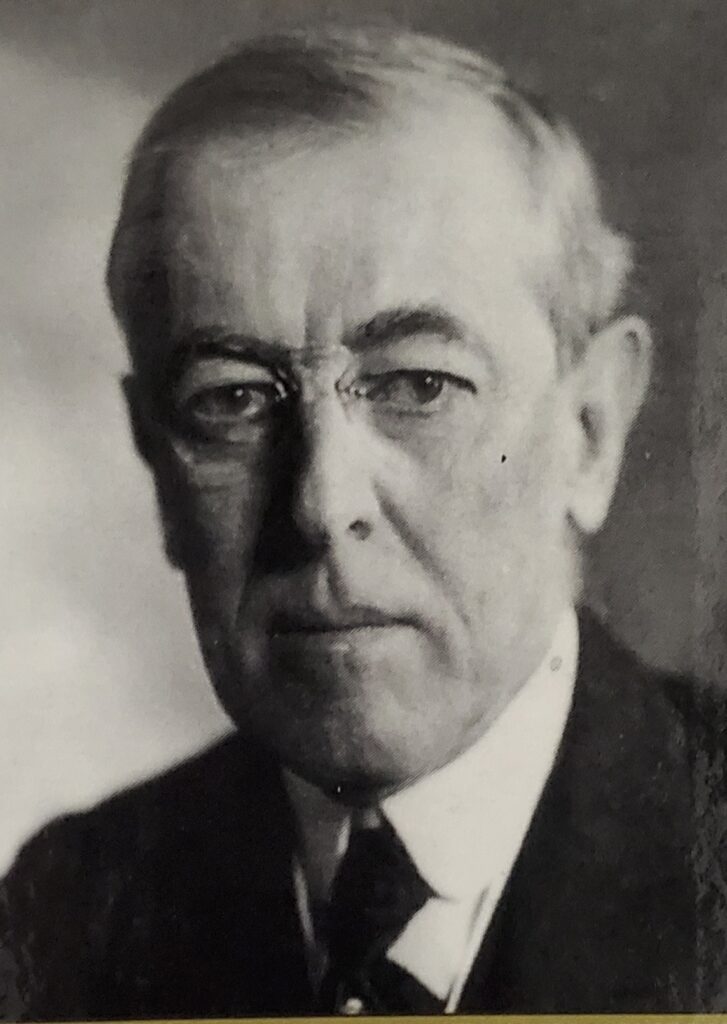Woodrow Wilson was known as a visionary for peace. He started his life as Thomas Woodrow Wilson because he was named for one of his grandfathers, the Reverend Thomas Woodrow. He was called Tommy throughout his life. His grandfather was a Presbyterian minister and came to the United States from Scotland in 1836. His father, the Reverend Joseph Ruggles Wilson was also a Presbyterian minister. Tommy was born in the Presbyterian manse at Staunton, Virginia. His mother was named Janet Woodrow. He was the third child born to this union.
Young Tommy spent his entire childhood in the South. His father moved from church to church. They lived in Augusta, Georgia, Columbia, South Carolina, and Wilmington, North Carolina. During the Civil War, his father’s church served as a hospital for wounded Confederate soldiers. Union soldiers were taken prisoner behind a fence in the churchyard. Historians say his sympathies were always with the South and the Confederacy.
Young Wilson was educated at home during his early years. His father was his teacher and reportedly had a passion for the precise use of words. He drilled his son on saying exactly what he meant. He stressed to his son the importance of being able to think on his feet and to talk without mumbling. When he became president, his reputation as a skilled writer and outstanding public speaker was a result of early drills by his father.
He was known to be a fan of Gladstone and wanted to be a great statesman. He was ambitious and described by a family servant as “an old young man who tried to explain the reason of things.” Initially, he enrolled as a freshman at Davidson College, a Presbyterian institution in North Carolina. His family thought he would become a Presbyterian minister. After becoming ill, he spent a year at home with his family in Wilmington. The following year, he enrolled as a freshman at The College of New Jersey, now known as Princeton. After graduating, he enrolled at the University of Virginia’s law school. Later, he enrolled as a graduate student at John Hopkins University to prepare himself for a career in scholarship. He started a career as a college professor at Bryn Mawr College. John Hopkins University granted him a doctor of philosophy (Ph.D.).
As an adult, Wilson was described as a hard man to like. He was smart and charming, but smug and a bit arrogant. He could force himself to be outgoing but by nature, he was a loner and trusted almost no one.
By this time, he had married his first wife, Ellen. Eventually they had three daughters. After teaching at Wesleyan University, he obtained a professorship at his alma mater, The College of New Jersey. He taught for twelve years and served as president for eight. He was recruited to run for the governor of New Jersey. He ran as a progressive and advocated for stronger government. He served as governor from 1910-1913. Two years later, he was nominated for president by the Democratic Party. He won with just 42 percent of the vote.
Inauguration Day was March 4, 1913. After taking the oath of office, he stepped to the lectern at the east front of the Capitol to make his inaugural address. He saw the soldiers had kept spectators at a distance. Disapproving, he issued his first order as president. He told the soldiers to let the people come forward.
As president, he instituted the first regular White House press conferences and ended the tradition of presidents not addressing Congress in person. He succeeded in weaning the Democrats from their Jeffersonian origins that include pro states’ rights and anti-Washington. His reform included lowered tariffs. He was successful but an income tax was established to make up for lost revenue. His second reform was banking and the Federal Reserve System was created. His third reform was the control of business monopolies that stifled competition in industries like oil and steel. These were described as major achievements. During his first term as president, his wife Ellen’s health began to decline. She died a short time later. He later met and married a widow named Edith Bolling Galt.
With the American entrance into World War I in April 1917, Wilson became a war-time president. He was also known as the peace-minded president. He drafted a treaty that would end the war on terms he regarded as fair. He suggested an international body called the League of Nations, to prevent future wars.
President Wilson was ranked by the Federalist Society and The Wall Street Journal as the 11th greatest president.
Francie Mae, October 28, 2022.
References
Rogers, James T. 1997. Woodrow Wilson, Visionary for Peace. New York, New York. Facts on File, Inc.
Taranto, James and Leo, Leonard. 2004. Presidential Leadership. Rating the Best and the Worst in the White House. New York, New York. Wall Street Journal Book.
